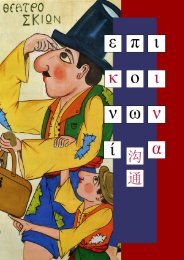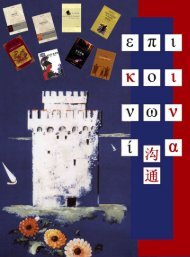Fifth Issue
Fifth Issue
Fifth Issue
You also want an ePaper? Increase the reach of your titles
YUMPU automatically turns print PDFs into web optimized ePapers that Google loves.
their rooms and the yards of the houses, played a great role in the spread of the Shadow<br />
Theatre. The reason women were allowed to attend the show was because men<br />
performing could not be seen behind the screen and thus, did not have any contact with<br />
them.<br />
The Chinese Shadow Theatre drew its<br />
themes from popular stories and legends, in<br />
which a good harvest, welfare, and longevity<br />
played a central role; likewise, the<br />
accomplishments of bold generals, the<br />
beneficences of loyal ministers and the virtues of<br />
young, noble ladies. As a result, these works, besides providing a form of entertainment,<br />
took the responsibility of instructing an ethical education, by presenting virtuous, brave<br />
and obedient characters. Characters either real or fictional or more commonly, historical<br />
figures and events were covered by the haze of myth, but nonetheless foretold the<br />
imitation of such model figures in a society such as the Chinese, that had previously<br />
employed imitating positive figures drawn from its historical past as a main form of<br />
education.<br />
It is precisely this feature that sets the Chinese Shadow Theatre apart from other<br />
Asian ones; that is to say, the absence of objects of worship and its focus on everyday<br />
themes, which without a doubt is in line with the character of Chinese culture, that is, the<br />
absence of a transcendental power and its founding on immanent facts. It is about a fine<br />
characteristic of the Chinese world, that is mirrored in the ways of artistic expression and<br />
generally all the expressions of human life.<br />
The beginning<br />
There are several different myths regarding the origination of the Chinese Shadow<br />
Theatre. Emperors and concubines, princesses and maidservants, generals and common<br />
soldiers, Taoists and Buddhist monks, dragons and other mythical creatures, all occupy a<br />
40






